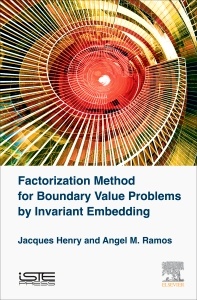Factorization of Boundary Value Problems Using the Invariant Embedding Method
Auteurs : Henry Jacques, Ramos A. M.

Factorization Method for Boundary Value Problems by Invariant Embedding presents a new theory for linear elliptic boundary value problems. The authors provide a transformation of the problem in two initial value problems that are uncoupled, enabling you to solve these successively. This method appears similar to the Gauss block factorization of the matrix, obtained in finite dimension after discretization of the problem. This proposed method is comparable to the computation of optimal feedbacks for linear quadratic control problems.
1: Presentation of the Formal Computation of Factorization
2: Justification of the Factorization Computation
3: Complements to the Model Problem
4: Interpretation of the Factorization through a Control Problem
5: Factorization of the Discretized Problem
6: Other Problems
7: Other Shapes of Domain
8: Factorization by the QR Method
9: Representation Formulas for Solutions of Riccati Equations
His research is focused on modeling, optimization and simulation in Science and Technology, mainly using Partial Differential Equations. His research lines are the following: Epidemic modeling, spatial-stochastic individual based models, SIR models, hybrid models, risk analysis, validation with real data, control measures, economic and climate change impact analysis. He received his PhD. in Applied Mathematics from UCM< in July 1996. He is Director of the UCM Research Group Mathematical Models in Science and Engineering: Development, Analysis, Numerical Simulation and Control (MOMAT) since 2005.
- Develops the invariant embedding technique for boundary value problems
- Makes a link between control theory, boundary value problems and the Gauss factorization
- Presents a new theory for successively solving linear elliptic boundary value problems
- Includes a transformation in two initial value problems that are uncoupled
Date de parution : 10-2016
Ouvrage de 256 p.
15x22.8 cm
Thème de Factorization of Boundary Value Problems Using the... :
Mots-clés :
linear elliptic boundary; Gauss block; factorization; linear quadratic; control problems



